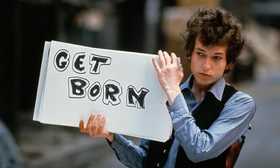
Dylan’s point is not really about politics or society as such, though they are seriously damaged and implicated. Rather his song is an existential cry of challenge and defiant love. As one observant commentator (Paul Williams) puts it, it paints a portrait of how we are so often given a false picture of reality, coming at us from every direction. In identfying these characteristics of the world around us, we are then invited to set ourselves free from their captivity. Instead of settling for deathly living, we are encouraged to choose life in the face of death, being busy being born rather than busy dying.
Finding life in the face of death, and rejecting deathly living: this is at the heart of the feast of Christ’s nativity, as it is the heart of Christian Good News itself. For the nativity too unmasks the world’s hypocrisy and cruelty and challenges us to new ways of seeing and being. Will we choose to be busy being born, sharing in the possibilities of new life for all, in God’s dream of a world of compassion? Or will we settle for living lives of living death and inflicting deathly life on others? It is up to us. Will we come to the manger, and to the cross, where true and lasting love is found, or not?
Sometimes you know, we can become so focused on the Christ child that we can miss out on how God is actually born anew in all the others in the nativity story. For each of the human characters in the nativity chose to be busy being born to new life, rather than settling for living death. In Mary’s case, she had the courage to nurture and give birth to the new life within her, even though this risked her reputation, violence and even death. Joseph, similarly, had to decide whether to stay captive to death-bearing moral conventions or to accept the truth of the love and new life stirring within him. The shepherds, for their part, could have stayed bound by fear, prisoners of powerful politicians and vulnerable to their populist pretensions. The magi could have remained encased in their own culture and philosophies, keeping their religion apart or using it as a tool to oppress others. All of them however chose to seize God’s gift of freedom, not settling for less than they could be. Each stepped out of their own potential closets of deathly living and became busy being born.
Can we then see, and hear, and act? The point of the feast of Christ’s nativity is not primarily to remind us of love being born long ago. The point is, above all, to invite us to live: to start being busy born into the possibilities of the greatest love of all. For as the great Christian mystic Meister Eckhart said, the Incarnation means nothing if Christ is not also daily born in us.
Whoever ‘is not busy being born is busy dying’: which path will we choose this Christmas, and in the days ahead? It is not an easy thing to become the person, and the people, God has created us to be. As individuals, communities and nations, it can be very scary to let go of the chains that bind and lead to death. Indeed, as someone said to me this week, it is sometimes like taking a leap and trusting that we will grow wings on the way down. Yet, if we are responding to God’s love stirring with us, to the true light in the darkness, then we can trust. For, as the feast of the nativity reminds us, love is born in the midst of poverty, suffering and darkness and transforms them all. God’s angels are all around. Believe it not, each of us may be one in disguise. Indeed it is core to being Church that we seek to be angels to one another through God's grace. So may God’s love so touch and transform us this Christmas. In the words of the Peace Prayer: Lead us from death to life, from falsehood to truth. Lead us from despair to hope, from fear to trust. Lead us from hate to love, from war to peace. In the Name of the Prince of Peace, Amen.
by Jo Inkpin, for Midnight Mass 2016
 RSS Feed
RSS Feed